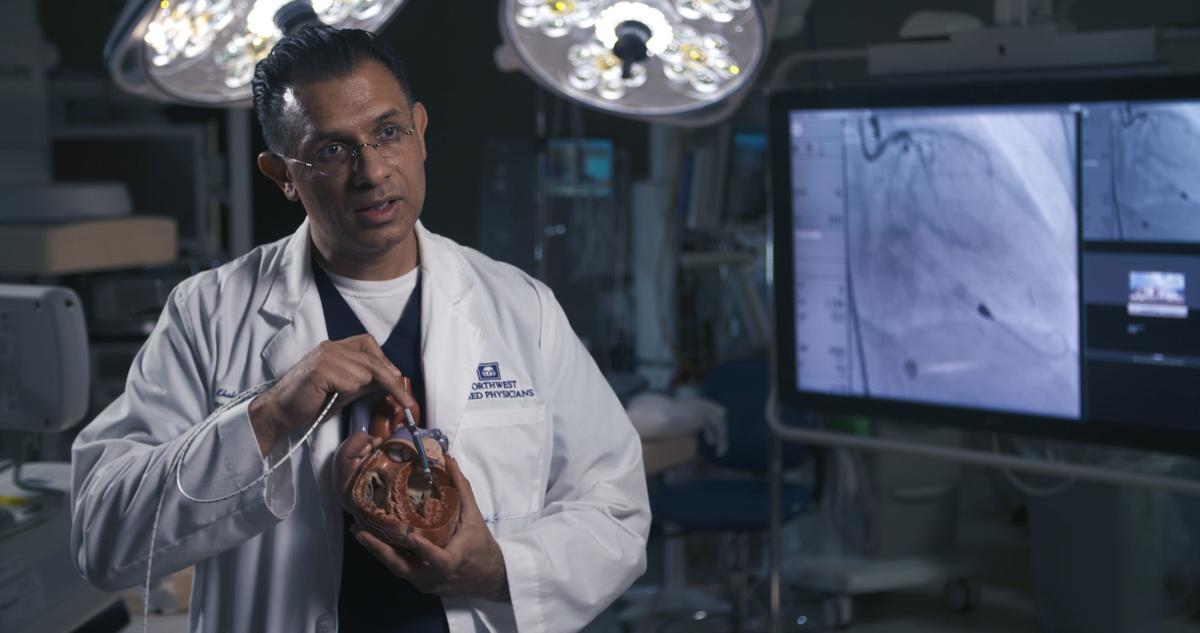Surgeons at Northwest Medical Center are using new devices in hopes of providing better options for high-risk patients with heart problems.
Among these new tools is the world’s smallest heart pump, which helped a 74-year-old man who suffered a heart attack and credits the device to helping him survive.
In February, Northwest became the first hospital in Arizona to place the Impella LD heart pump during open heart surgery, and has used the device six other times since then. Developed by Abiomed, the Impella LD is the smallest heart pump in the world and has only been used 431 times globally.
“You don’t just operate on a patient. You’ve got the whole family to think about, and you make it very personal. With each stitch, you think about that person’s family,” said Dr. Zain Khalpey, Northwest’s chief of cardiothoracic surgery. “In any case, I think you should have a safety net. This is one of my safety nets for high-risk patients.”
According to Khalpey, the device helps circulate blood through the heart, lowering its workload and giving it time to recover. The pump is placed in the left ventricle of the heart and can stay there up to 14 days.
This pump was the only option in the case of 74-year-old Ray Carr, who lives in Tucson with his wife during the winter. Earlier this year, Carr was on the golf course when he began to feel weak and nauseous. After a similar incident the following day, Carr went to urgent care where he was told that he had a heart attack.
“Two of my arteries were blocked 100%, one was blocked 99%,” he said. “They couldn’t figure out how I was walking around.”
According to Carr, he exercised regularly and didn’t drink or smoke, so the experience came as a shock.
During a 10-hour surgery at Northwest, Dr. Khalpey placed the pump into Carr’s heart. He was the first patient in Arizona to undergo this procedure. The pump stayed there for two weeks, which allowed his heart time to heal before the next surgery.
“My heart would not have been strong enough to survive the surgery on its own,” said Carr. “Had this technology not been available, I wouldn’t be talking to you today.”
Khalpey said the pump is known in the medical field as a bridge-to-recovery device. Another key benefit of using this pump is its ability to help other organs within the body recover as well.
“When your heart goes down, the quickest barometer of how organs are being perfused (supplied with blood) is your kidneys. They’re the first to go and the last to come back after your heart goes. So, they are a good index of how good or bad you’re going to do and how long the recovery time will be,” he said. “When we’re looking at our data, it shows that this device helps perfuse the kidneys in these high-risk patients and minimizes the use of temporary kidney machines.”
This is one of several new technologies that surgeons at Northwest have begun to use since they began to develop a Heart Recovery Program. They are also among a handful of hospitals in the country, the only hospital in the Southwest, to use laser therapy to help restore heart function by making small holes in the muscle. Over time, this causes new blood vessels to grow and promotes healthy heart function. Northwest has done more of these procedures than any other hospital in the country.
“We’re creating a fully-fledged heart recovery program,” said Khalpey. “There’s not enough resources. There’s a shortage of organ donors. I have put so many artificial hearts in patients, and machines are beautiful, but biology is even more beautiful. Having this hybrid scenario where we can now think about how to keep your own heart, rather than getting someone else’s heart or a mechanical device, makes quality of life so much better.”





